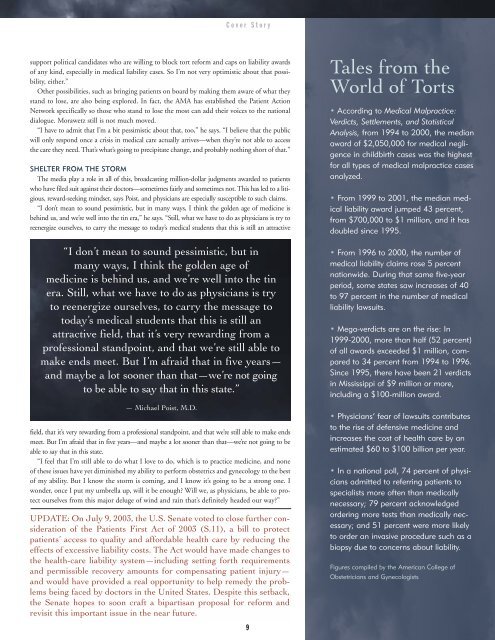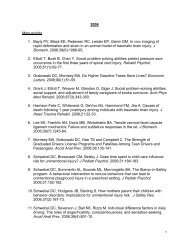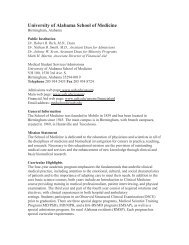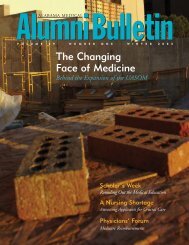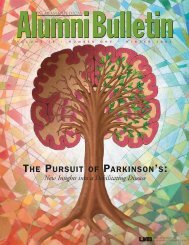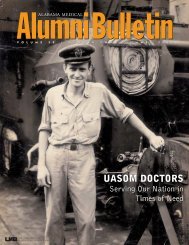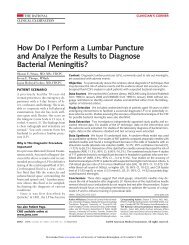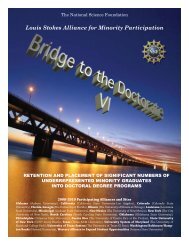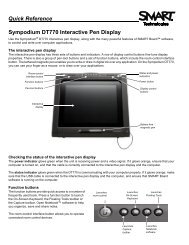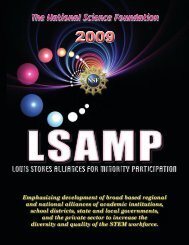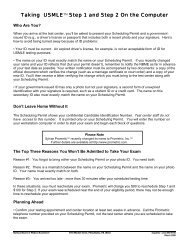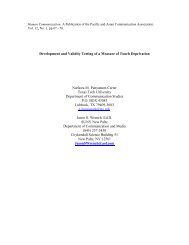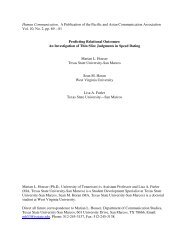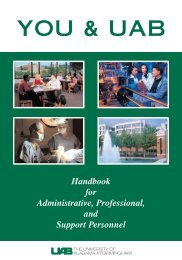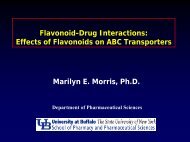AlumniBulletin - The University of Alabama at Birmingham
AlumniBulletin - The University of Alabama at Birmingham
AlumniBulletin - The University of Alabama at Birmingham
You also want an ePaper? Increase the reach of your titles
YUMPU automatically turns print PDFs into web optimized ePapers that Google loves.
Cover Story<br />
support political candid<strong>at</strong>es who are willing to block tort reform and caps on liability awards<br />
<strong>of</strong> any kind, especially in medical liability cases. So I’m not very optimistic about th<strong>at</strong> possibility,<br />
either.”<br />
Other possibilities, such as bringing p<strong>at</strong>ients on board by making them aware <strong>of</strong> wh<strong>at</strong> they<br />
stand to lose, are also being explored. In fact, the AMA has established the P<strong>at</strong>ient Action<br />
Network specifically so those who stand to lose the most can add their voices to the n<strong>at</strong>ional<br />
dialogue. Morawetz still is not much moved.<br />
“I have to admit th<strong>at</strong> I’m a bit pessimistic about th<strong>at</strong>, too,” he says. “I believe th<strong>at</strong> the public<br />
will only respond once a crisis in medical care actually arrives—when they’re not able to access<br />
the care they need. Th<strong>at</strong>’s wh<strong>at</strong>’s going to precipit<strong>at</strong>e change, and probably nothing short <strong>of</strong> th<strong>at</strong>.”<br />
SHELTER FROM THE STORM<br />
<strong>The</strong> media play a role in all <strong>of</strong> this, broadcasting million-dollar judgments awarded to p<strong>at</strong>ients<br />
who have filed suit against their doctors—sometimes fairly and sometimes not. This has led to a litigious,<br />
reward-seeking mindset, says Poist, and physicians are especially susceptible to such claims.<br />
“I don’t mean to sound pessimistic, but in many ways, I think the golden age <strong>of</strong> medicine is<br />
behind us, and we’re well into the tin era,” he says. “Still, wh<strong>at</strong> we have to do as physicians is try to<br />
reenergize ourselves, to carry the message to today’s medical students th<strong>at</strong> this is still an <strong>at</strong>tractive<br />
“I don’t mean to sound pessimistic, but in<br />
many ways, I think the golden age <strong>of</strong><br />
medicine is behind us, and we’re well into the tin<br />
era. Still, wh<strong>at</strong> we have to do as physicians is try<br />
to reenergize ourselves, to carry the message to<br />
today’s medical students th<strong>at</strong> this is still an<br />
<strong>at</strong>tractive field, th<strong>at</strong> it’s very rewarding from a<br />
pr<strong>of</strong>essional standpoint, and th<strong>at</strong> we’re still able to<br />
make ends meet. But I’m afraid th<strong>at</strong> in five years—<br />
and maybe a lot sooner than th<strong>at</strong>—we’re not going<br />
to be able to say th<strong>at</strong> in this st<strong>at</strong>e.”<br />
— Michael Poist, M.D.<br />
field, th<strong>at</strong> it’s very rewarding from a pr<strong>of</strong>essional standpoint, and th<strong>at</strong> we’re still able to make ends<br />
meet. But I’m afraid th<strong>at</strong> in five years—and maybe a lot sooner than th<strong>at</strong>—we’re not going to be<br />
able to say th<strong>at</strong> in this st<strong>at</strong>e.<br />
“I feel th<strong>at</strong> I’m still able to do wh<strong>at</strong> I love to do, which is to practice medicine, and none<br />
<strong>of</strong> these issues have yet diminished my ability to perform obstetrics and gynecology to the best<br />
<strong>of</strong> my ability. But I know the storm is coming, and I know it’s going to be a strong one. I<br />
wonder, once I put my umbrella up, will it be enough? Will we, as physicians, be able to protect<br />
ourselves from this major deluge <strong>of</strong> wind and rain th<strong>at</strong>’s definitely headed our way?”<br />
UPDATE: On July 9, 2003, the U.S. Sen<strong>at</strong>e voted to close further consider<strong>at</strong>ion<br />
<strong>of</strong> the P<strong>at</strong>ients First Act <strong>of</strong> 2003 (S.11), a bill to protect<br />
p<strong>at</strong>ients’ access to quality and affordable health care by reducing the<br />
effects <strong>of</strong> excessive liability costs. <strong>The</strong> Act would have made changes to<br />
the health-care liability system—including setting forth requirements<br />
and permissible recovery amounts for compens<strong>at</strong>ing p<strong>at</strong>ient injury—<br />
and would have provided a real opportunity to help remedy the problems<br />
being faced by doctors in the United St<strong>at</strong>es. Despite this setback,<br />
the Sen<strong>at</strong>e hopes to soon craft a bipartisan proposal for reform and<br />
revisit this important issue in the near future.<br />
Tales from the<br />
World <strong>of</strong> Torts<br />
• According to Medical Malpractice:<br />
Verdicts, Settlements, and St<strong>at</strong>istical<br />
Analysis, from 1994 to 2000, the median<br />
award <strong>of</strong> $2,050,000 for medical negligence<br />
in childbirth cases was the highest<br />
for all types <strong>of</strong> medical malpractice cases<br />
analyzed.<br />
• From 1999 to 2001, the median medical<br />
liability award jumped 43 percent,<br />
from $700,000 to $1 million, and it has<br />
doubled since 1995.<br />
• From 1996 to 2000, the number <strong>of</strong><br />
medical liability claims rose 5 percent<br />
n<strong>at</strong>ionwide. During th<strong>at</strong> same five-year<br />
period, some st<strong>at</strong>es saw increases <strong>of</strong> 40<br />
to 97 percent in the number <strong>of</strong> medical<br />
liability lawsuits.<br />
• Mega-verdicts are on the rise: In<br />
1999-2000, more than half (52 percent)<br />
<strong>of</strong> all awards exceeded $1 million, compared<br />
to 34 percent from 1994 to 1996.<br />
Since 1995, there have been 21 verdicts<br />
in Mississippi <strong>of</strong> $9 million or more,<br />
including a $100-million award.<br />
• Physicians’ fear <strong>of</strong> lawsuits contributes<br />
to the rise <strong>of</strong> defensive medicine and<br />
increases the cost <strong>of</strong> health care by an<br />
estim<strong>at</strong>ed $60 to $100 billion per year.<br />
• In a n<strong>at</strong>ional poll, 74 percent <strong>of</strong> physicians<br />
admitted to referring p<strong>at</strong>ients to<br />
specialists more <strong>of</strong>ten than medically<br />
necessary; 79 percent acknowledged<br />
ordering more tests than medically necessary;<br />
and 51 percent were more likely<br />
to order an invasive procedure such as a<br />
biopsy due to concerns about liability.<br />
Figures compiled by the American College <strong>of</strong><br />
Obstetricians and Gynecologists<br />
9


